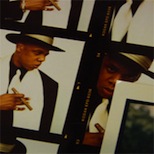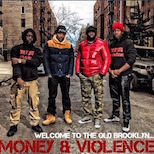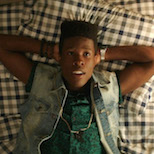Brown Skin Lady
12.29.2011
LEISURE
An Oversimplification of Her Beauty • Teaser from Terence Nance • Terence Etc. on Vimeo.
This January, Terence Nance and his motley yet motivated mob of artists will head to Utah on a mission to spread the word about a new Black cinema. His An Oversimplification of Her Beauty, a wildly imaginative feature film was selected to premiere at the Sundance Film Festival. The teaser to the film communicates the tenderness and thrill of deep love, but it also transmits an exciting, limitless vision for what Black film can, and should be. More than any criticism on the didacticism or lack of creativity of say, a Tyler Perry film, Oversimplification is a curative vision; a breakout manifesto that’s ultimately about love. A single film debut shouldn’t have to carry the burden of “Black cinema” on its reel, but director Nance, whose parents were both independent artists and art advocates in his native Dallas, is an ’80s baby who considers widening the lens his duty.
Life+Times: You’ve said that your film An Oversimplification Of Her Beauty breaks into animation because it allowed you more freedom to show interior, heart and mind spaces. You’re also a painter, an installation artist…
Terence Nance: I’m post medium. When I was in school most of what I made had a film or video element but even with a lot of my installations, murals, I was trying to create a culture: It woud be simultaneously performative and interactive. For example, I did an installation that read: “Rule #1 for Black People, ‘Don’t purchase cotton that is already yours'” so there was text, video, the art piece itself and it was meant to be provocative.
L+T: You attended NYU, but not as a film student. You were focused on fine art. Did you at least take advantage of their massive film library? Have you seen Cabinet of Dr. Caligari and Battleship Potemkin? What’s your cinema history education been like?
TN: Netflix has definitely been my film school. I came to film very late. I went to school for visual arts, the first films that I understood as art were Y Tu Mamá También and Amelie and that was because I had a girlfriend who insisted I watch these films, and watch them as art. Years later Dogville became a stylistic reference, it inspired me, in terms of the narration, to write my short film How Would You Feel? which is how Oversimplification… began.
L+T: How does all the, for lack of a better word, the “buzz” feel? Your film was quite viral amongst the trendsetting Afro-futurist set, even before it was accepted into the upcoming Sundance Film Festival.
TN: To be validated by one’s community means everything. As a social person, I exist in a community. My community’s here in Brooklyn, but it transcends that. I call it a swarm – Black people who are into this, whether you call it Afro-futurist or just art – it keeps me going, it’s necessary, especially trying to make a feature film, which can feel lonely and like a marathon. On some levels it’s just begun, I’m finishing the film, fundraising for the sound mix and post-production, hoping to have it distributed or meet someone who might help me get it distributed at Sundance. At the same time, while we we’re at Sundance it’s important to me that we’re on message, that we communicate this as a movement.
L+T: Tell me about your movement.
TN: I feel the next cultural frontier for people of color is filmmaking, we’ve definitely mastered music, and I see my generation making films and creating public dialogue about filmmaking, the way we have about music for generations. Building on the backs of our elders, obviously; Wendell B. Harris, Charles Burnett, Spike Lee, Haile Gerima, Julie Dash, filmmakers whose work is important. To that end Cinema Stereo is a collective I helped found this year with several other emerging filmmakers I know. We want to galvanize our collective talents and foster the production of innovative Black cinema. We are a community of filmmakers focused on restoring the humanity and diversity of Black narratives, while making the dopest shit of all time. Most importantly, we want to have high output, we want to go from one film to another and I think that given where technology is, and the range of what’s become acceptable in terms of production value, my generation, and our collective, is uniquely poised to really make a lot of meaningful films. I also belong to another collective of about 17 artists, entrepreneurs, musicians and organizers called MVMT, our mission is to promote collective empowerment.
L+T: That’s an important and interesting distinction about output. So often there’s one or the other, there’s Julie Dash or Kasi Lemmons with one or two amazing films and Spike with a dozen films where only two or three matter in terms of quality.
TN: Kasi Lemmons is someone with undeniable talent who can do anything but who’s only made two really great, quality films. She seems to have decided that she’ll only make films of a certain quality so she’s only made three films in 15 years. But I’ve decided to make lots of films, even if it means I have to make it for $8 with no actors.
L+T: Tell me about An Oversimplification Of Her Beauty. It seems a sometimes sad story about an intense relationship.
TN: The impetus for making it was my relationship with one woman in particular. I really had to examine the internal dialogue I was having about us. I was also examining myself, that ambiguity in my life post-college, and how it manifested itself in my romantic relationship. It was everything and nothing all at once. In terms of the execution, on a formal level I wanted to break down the linear idea that love is rational, that it’s A to Z, when it never, ever is.
L+T: What surprised you about making a feature film?
TN: I learned by doing it so I had very few expectations. I didn’t think Oversimplification was going to be a feature. It began as a short and it kept getting longer. When I was in the middle of it growing into a feature and I started putting all the elements together I was surprised by how difficult it was to manage the moving parts – the animators, the sound mixers, the production designers. As someone who comes from visual art it was a real learning curve, understanding the idea of collaboration. Directing is coralling but it’s also about communicating ideas to people in a way where they can execute them on their own. I have a specific idea of how I want all the elements to be. I’m learning how to communicate in a very simple and direct way exactly what I want.





